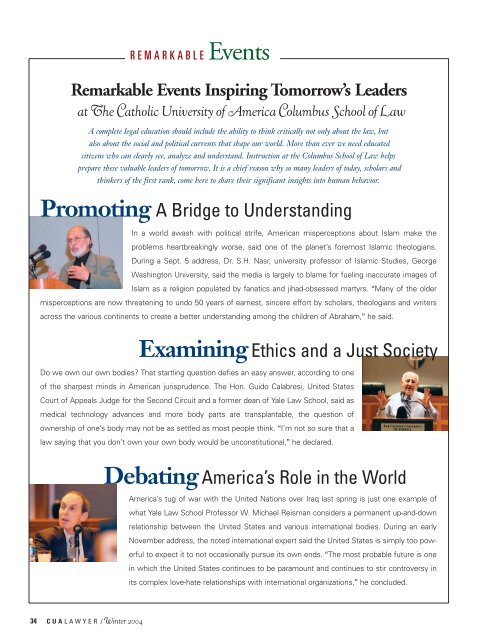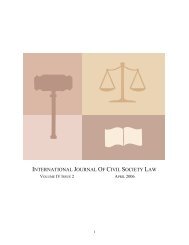CUA Cover Winter 2004 final (Page 2) - Columbus School of Law
CUA Cover Winter 2004 final (Page 2) - Columbus School of Law
CUA Cover Winter 2004 final (Page 2) - Columbus School of Law
- No tags were found...
You also want an ePaper? Increase the reach of your titles
YUMPU automatically turns print PDFs into web optimized ePapers that Google loves.
REMARKABLEEventsRemarkable Events Inspiring Tomorrow’s Leadersat The Catholic University <strong>of</strong> America <strong>Columbus</strong> <strong>School</strong> <strong>of</strong> <strong>Law</strong>A complete legal education should include the ability to think critically not only about the law, butalso about the social and political currents that shape our world. More than ever we need educatedcitizens who can clearly see, analyze and understand. Instruction at the <strong>Columbus</strong> <strong>School</strong> <strong>of</strong> <strong>Law</strong> helpsprepare these valuable leaders <strong>of</strong> tomorrow. It is a chief reason why so many leaders <strong>of</strong> today, scholars andthinkers <strong>of</strong> the first rank, come here to share their significant insights into human behavior.Promoting A Bridge to UnderstandingIn a world awash with political strife, American misperceptions about Islam make theproblems heartbreakingly worse, said one <strong>of</strong> the planet’s foremost Islamic theologians.During a Sept. 5 address, Dr. S.H. Nasr, university pr<strong>of</strong>essor <strong>of</strong> Islamic Studies, GeorgeWashington University, said the media is largely to blame for fueling inaccurate images <strong>of</strong>Islam as a religion populated by fanatics and jihad-obsessed martyrs. “Many <strong>of</strong> the oldermisperceptions are now threatening to undo 50 years <strong>of</strong> earnest, sincere effort by scholars, theologians and writersacross the various continents to create a better understanding among the children <strong>of</strong> Abraham,” he said.Examining Ethics and a Just SocietyDo we own our own bodies? That startling question defies an easy answer, according to one<strong>of</strong> the sharpest minds in American jurisprudence. The Hon. Guido Calabresi, United StatesCourt <strong>of</strong> Appeals Judge for the Second Circuit and a former dean <strong>of</strong> Yale <strong>Law</strong> <strong>School</strong>, said asmedical technology advances and more body parts are transplantable, the question <strong>of</strong>ownership <strong>of</strong> one’s body may not be as settled as most people think. “I’m not so sure that alaw saying that you don’t own your own body would be unconstitutional,” he declared.Debating America’s Role in the WorldAmerica’s tug <strong>of</strong> war with the United Nations over Iraq last spring is just one example <strong>of</strong>what Yale <strong>Law</strong> <strong>School</strong> Pr<strong>of</strong>essor W. Michael Reisman considers a permanent up-and-downrelationship between the United States and various international bodies. During an earlyNovember address, the noted international expert said the United States is simply too powerfulto expect it to not occasionally pursue its own ends. “The most probable future is onein which the United States continues to be paramount and continues to stir controversy inits complex love-hate relationships with international organizations,” he concluded.34<strong>CUA</strong>LAWYER /<strong>Winter</strong> <strong>2004</strong>
















